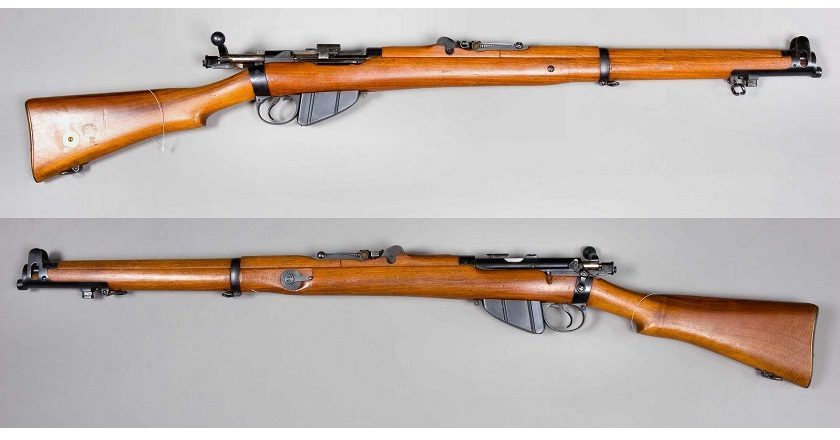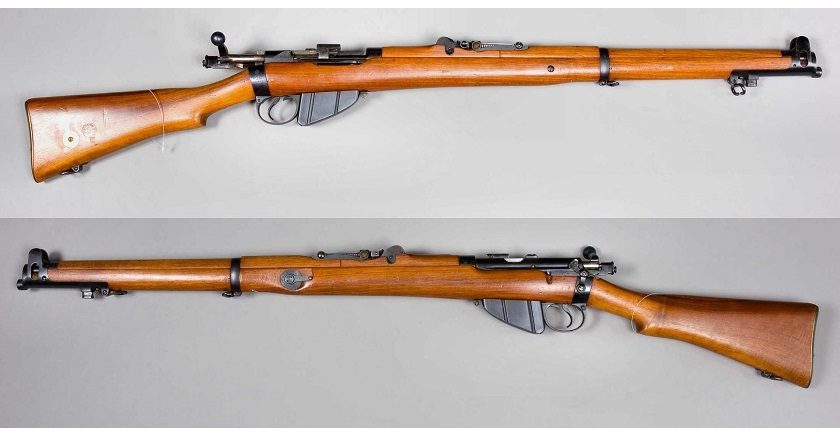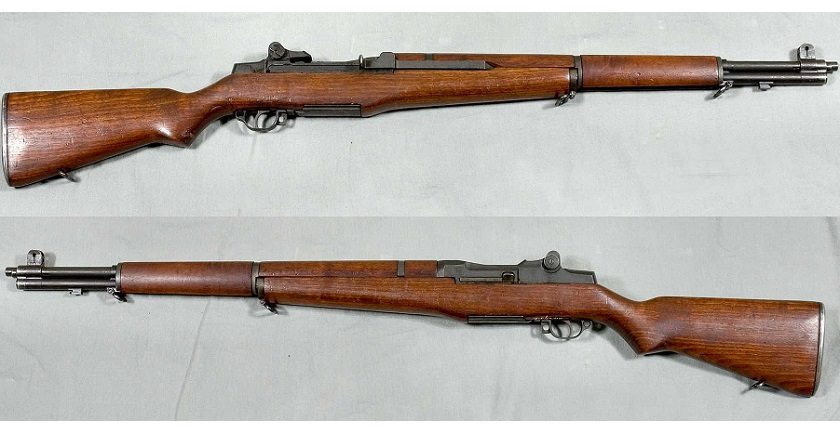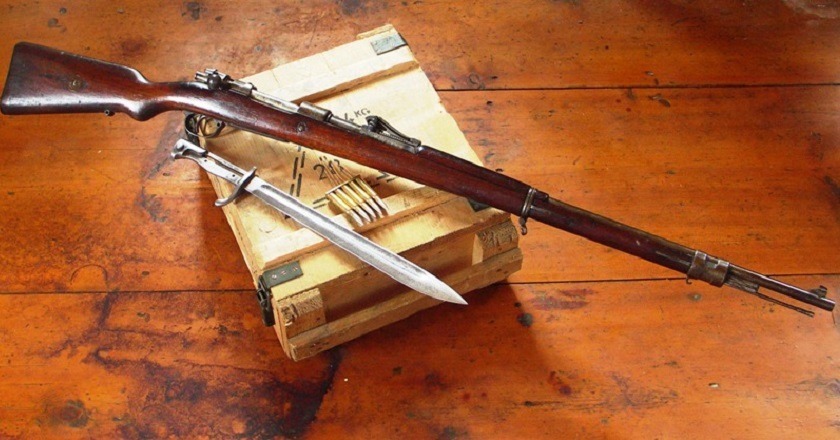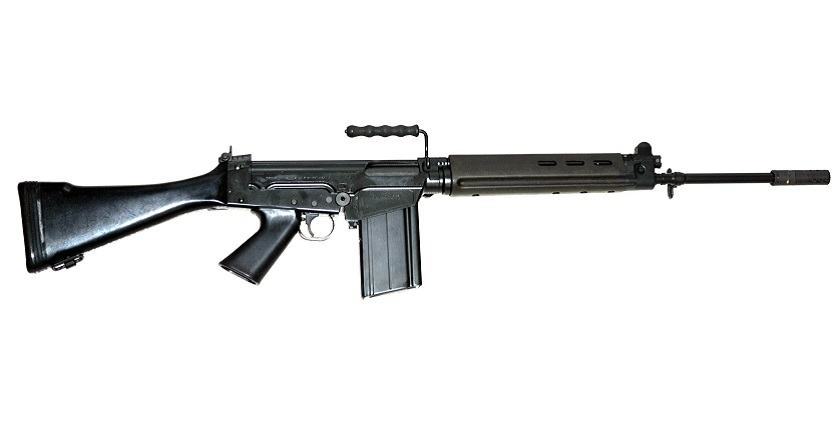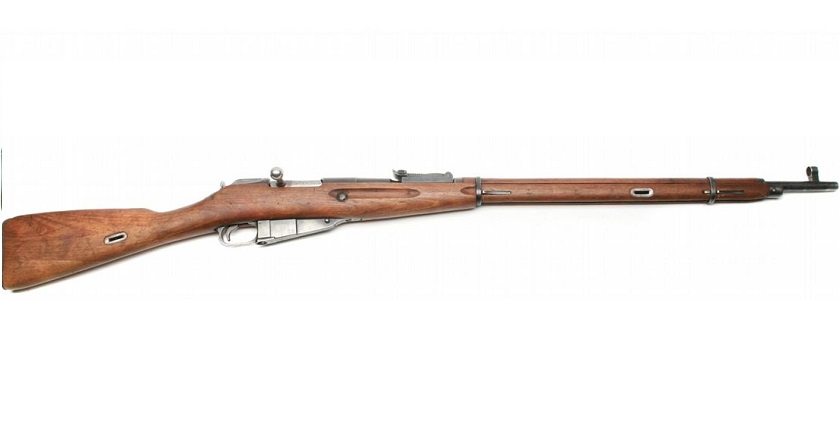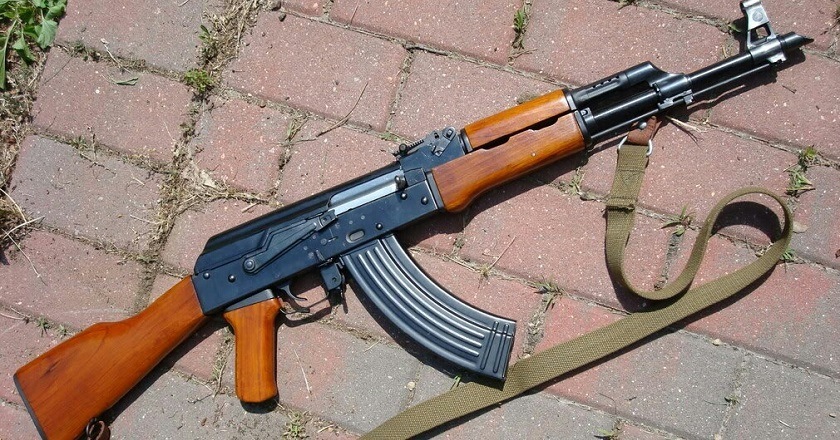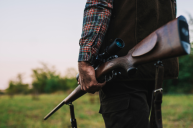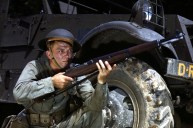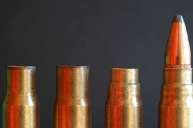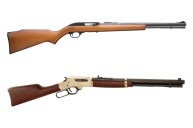Though technology has greatly improved over the past century, rifles have been the primary infantry tool for the past 150+ years. Here are nine of the deadliest rifles of all-time.
No matter how much technology advances and no matter how many new weapons appear on the battlefield, war still often comes down to fighting between infantrymen in the mud.
An infantryman's best friend is his rifle and a good rifle can sometimes mean the difference between life and death on the battlefield. Good rifles tend to hang around for decades with only minor upgrades and modifications, while the bad ones often quickly fade away.
Many of these rifles have also left their mark on the world by influencing subsequent firearm designs. After all, combat is serious business and people tend to duplicate what works.
Not surprisingly, the rifles on this list have been in use for extremely long periods of time and most have appeared on countless battlefields all over the world.
Pattern 1853 Enfield
The 1853 Enfield rifled musket was one of the very first rifles widely adopted by a major European power on a large scale. Though it did not have an extremely long run in service with the British Army, the 1853 Enfield was introduced just in time for use in the Crimean War.
A few years later, the 1853 Enfield was also a major factor in the Indian Rebellion of 1857. Not only did the rifle see extensive use in that war, but false rumors that the bullets were lubricated with either beef or pork fat were one of several factors contributing to the start of that rebellion.
Finally, the Pattern 1853 Enfield also saw widespread use in the American Civil War. Both Union and Confederate troops used the rifle in large numbers, but it was especially popular with the Confederates. Approximately 1.5 million Enfield rifles were produced in the 1850s and 1860s. Of these, approximately 900,000 were sent to the United States during the Civil War.
Springfield Rifled Musket
Along with the Pattern 1853 Enfield, the Springfield Model 1861 and Model 1863 were the other primary rifles used during the American Civil War. Introduced right at the beginning of the war, the American government manufactured over 1.5 million Springfields over the course of just a few years.
Similar to the case with the Enfield, the Springfield was used by Soldiers on both sides, but it was most common in the hands of Soldiers in the United States Army.
While the Springfield was quickly phased out in the 1860s in favor of breech-loading rifles, it was the single most common firearm used during the Civil War and served as a model for subsequent breech-loaders manufactured by Springfield.
Lee-Enfield Rifle
Adopted by the British Army in 1895 and firing the .303 British cartridge, the Lee-Enfield was the first rifle used by the British that was designed to use smokeless powder.
Combined with a detachable 10 round magazine and eventually modified to accept five round stripper clips, the Lee-Enfield quickly gained a reputation for being able to deliver extremely high rate of fire in the hands of a trained marksman.
In many ways, the Lee-Enfield rifle became a symbol of British Colonial rule, and are still often found in large numbers in former British colonies. Though few armies still use the Lee-Enfield for front line service, they are still quite popular among reserve units, police forces, and civilian sportsmen.
With over 17,000,000 rifles of all variants produced, the Lee-Enfield was a fixture of the British Empire for decades and was used (sometimes by both sides) in dozens of wars, rebellions, and other conflicts during its heyday.
It first drew blood during the Second Boer War and also saw action during World War I, the Irish War of Independence, the Irish Civil War, World War II, the Indo-Pakistani Wars, the Malayan Emergency, the Korean War, the Suez Crisis, and numerous colonial conflicts in Africa and Asia. It was also used extensively by the Mujahideen against the Soviets in Afghanistan.
Though it is not nearly as common as it used to be, small numbers of Lee-Enfield rifles are still seeing action in Afghanistan, Iraq, and Syria during the ongoing wars there.
M-1 Garand
Described by General George Patton as "the greatest battle implement ever devised," the M1 Garand was the primary rifle carried by American GIs during World War II and Korea.
Chambered in the venerable .30-06 Springfield cartridge, the semi-automatic M1 Garand and its unique 8-round en bloc clip gave the U.S. Army and Marine Corps a significant firepower advantage at short, medium, and long range over the Germans, Japanese, and Italians during World War II. By all accounts, it was an important contributor to the Allied victory.
Though the M1 Garand did not have as long of a run as some of the other rifles on this list, the armies that used it got decent mileage out of it during the mid-20th Century. Over 6,000,000 M1 Garand rifles were produced and it was the primary rifle carried by the United States Army and Marine Corps (and the militaries of several other countries) during World War II and Korea.
However, in addition to seeing limited use in countless smaller conflicts, it also saw action in the hands of the South Koreans during the Korean War, the South Vietnamese during the Vietnam War, the Israelis in several wars, and was used by the Greeks and Turks against each other during the Turkish invasion of Cyprus in 1974.
Mauser 1898
Introduced by the Germans in 1898, the Mauser 1898 featured the revolutionary controlled round feed system that Mauser is now famous for. Combined with the smokeless M/88 cartridge (later changed to 7.92x57mm), a relatively long effective range, and a five round internal magazine that could be loaded by a stripper clip, the Mauser 1898 was a potent weapon on the battlefield.
The Mauser 1898 (and its successor, the Karabiner 98k) were used by the German Army and several of its allies and puppet states in World War I and II. The rifle was also used in the Spanish Civil War, the Arab-Israeli Wars, the Korean War, the Vietnam War, numerous African colonial conflicts, Operation Iraqi Freedom, Operation Enduring Freedom, and is currently being used in the Syrian Civil War.
Since 1898, around 19,000,000 Mauser 1898 and Karabiner 98k rifles were produced.
FN-FAL
Nicknamed "The Right Arm of The Free World," the FN FAL is the probably the closest Western comparison to the ubiquitous AK series of rifles. Firing the 7.62x51mm cartridge and developed in Belgium in the 1940s and 1950s, the rifle was originally intended to be the standard NATO battle rifle. However, the United States declined to adopt the rifle, opting for the M-14 instead.
Even so, the FN FAL has been used by the armed forces of over 90 different countries all over the world. The United Kingdom, Canada, Australia, New Zealand, South Africa, Belgium, Luxemburg, the Netherlands, Israel, Argentina, Brazil, Portugal, Kuwait, and Rhodesia are just a few of the countries that have used the FN FAL during the last 50 years. The FN-FAL is currently still in production and an estimated 5,000,000 have been built to date.
Over the years, the FN FAL has been used in a number of wars and conflicts including the Falklands War (used by both sides), the Rhodesian Bush War, the South African Border War, the Angolan Civil War, the Malayan Emergency, the Congo Crisis, the Northern Ireland Conflict, the Vietnam War, the Six Day War, the War of Attrition, the Yom Kippur War, and Operation Desert Storm. More recently, the FN FAL is still seeing plenty of action in the ongoing wars in Libya, Syria, and Iraq.
M-16 Series
Adopted by the United States Army, Air Force, and Marine Corps in the 1960s by modifying the ArmaLite AR-15, the M-16 series of rifles was first used during the Vietnam War. The rifle was the first service rifle to be chambered in the 5.56x45mm cartridge, which is now the NATO standard.
Since the 1960s, the M-16 has undergone a number of modifications and is one of the longest tenured service rifles used by the United States military.
To date, the M-16 (or a version of it, like the C-7 or M4 carbine) has been used by over 70 countries, including the United States, South Korea, Israel, Iraq, Afghanistan, Costa Rica, Canada (C-7), El Salvador, Estonia, Denmark (C-7), the Philippines, Malaysia, and Turkey. The rifle is still in production and approximately 10,000,000 M-16 rifles (and all variants of the M-16) have been built to date.
The M-16 made its debut during the Vietnam War. Additionally, the M-16 was used extensively during the 1982 Israeli Invasion of Lebanon, Operation Desert Storm, the intervention in Somalia, and Operation Iraqi Freedom. Still the primary rifle for dozens of countries, the M-16 is seeing plenty of action in Afghanistan, Libya, and Syria these days.
Mosin-Nagant
With over 37,000,000 rifles of all variants produced since it was first adopted by the Russian Army in 1891, the Mosin-Nagant is the most prolific military bolt-action rifle in history.
Though not a beautiful or elegant rifle, the Mosin-Nagant has made a name for itself for being rugged, reliable, and easy to mass produce. Chambered in the potent 7.62x54mmR cartridge, the rifle was the primary armament of the Russian Empire and the Soviet Union for decades as both a regular infantry service rifle and a sniper rifle until it was eventually replaced by the SKS.
The Mosin-Nagant has seen such extensive use that it is impossible to list all of the places where it has seen action in the space provided. The rifle first drew blood during the Russo-Japanese War in 1905 and was used extensively by the Russians during World War I. It was then used by both sides during the Russian Revolution, Russian Civil War, and the Winter War with Finland. The rifle again went to work during World War II, where it was perhaps the most prolific weapon used during some of the heaviest fighting the world has ever seen.
Due primarily to the fact that the Soviet Union made a point of supplying communist forces with Mosin-Nagant rifles for decades, the rifle saw action in virtually every conflict during the Cold War including the Korean War, the Vietnam War, and the Soviet Invasion of Afghanistan. Even though the original design is well over 100 years old, Mosin-Nagant rifles are still in heavy use in ongoing conflicts, such as Iraq, Afghanistan, Syria, and Ukraine.
Kalashnikov Series of Rifles
Firing the intermediate power 7.62x39mm cartridge, the AK-47 assault rifle (and all its variants) has dramatically shaped the world in the nearly 70 years it has been in existence. While they're not known for being very accurate, the AK-47 makes up for this by being very inexpensive, simple to manufacture, easy to use, extremely reliable, and having a very high rate of fire (it's technically a machine gun after all).
Over 100,000,000 (and counting) Kalashnikovs have been produced since the rifle was first introduced. Well over 100 countries, including the Soviet Union/Russia, Poland, East Germany, Romania, Bulgaria, Albania, Yugoslavia, China, Vietnam, North Korea, Cuba, Israel, South Korea, Iran, Iraq, Angola, Egypt, Pakistan, and Afghanistan (just to name a few) have equipped their military and/or police forces with some version of the Kalashnikov over the last 70 years.
Some version of the Kalashnikov has been used in nearly every conflict and war of independence since the 1960s including the Vietnam War, the Rhodesian Bush War, the South African Border War, the Angolan Civil War, the Six Day War, the War of Attrition, the Yom Kippur War, the Lebanese Civil War and Operation Desert Storm. The rifle is still seeing plenty of action in Afghanistan, Iraq, Syria, Libyia, and Ukraine (among other places).
The Kalashnikov is so common in so many countries, many of them lawless and war torn, that one study estimates that over 250,000 people all over the world are killed by people using Kalashnikovs each year.
Like what you see? You can read more great articles by John McAdams on the Big Game Hunting Blog. Subscribe to his show: the Big Game Hunting Podcast.
NEXT: THE COLT 1991: A HANDGUN WORTH OF THE HALL OF FAME
WATCH
